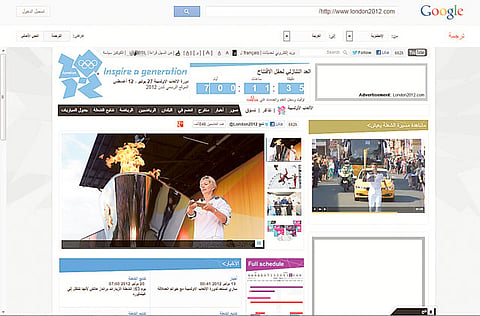Users finding more Arabic to login online
New technology, growing demand increase use of the language

Dubai:More often than not there’s little in the way of local language content or relevant services on the world wide web. This is a particular problem for the Arabic-speaking world.
But that is about to change. Icann — the body that regulates the web — has made it possible for full web addresses to be written in non-Latin characters. This is doing a lot to speed up the use of Arabic on the web.
“Technology companies, engineers and entrepreneurs are engaged in a concerted effort to Arabise the web to ensure websites and tools are available in Arabic, and to create platforms that can be used by local developers to easily create useful apps that better serve the local population,” said Mohammad Mourad, regional manager at Google Gulf.
Google has a team of engineers tasked with resolving some of the difficulties around how search engines and websites handle right-to-left languages, particularly Arabic. Sometimes, Arabic queries contain words written right-to-left, but numbers written left-to-right.
“The particular needs of right-to-left language support can also mean that the entire page layout for certain products [such as Gmail] need to be changed,” Mourad said.
There are an estimated 374 million Arab speakers around the world, with about 85 million being active web users. Around three-quarters of the UAE’s residents are online, while in Saudi Arabia it’s about 56 per cent compared to 44 per cent in Lebanon and 30 per cent in Jordan.
Yet, despite Arabic being the fifth most-spoken language in the world and Arabic speakers accounting for around seven per cent of the world’s population, Arabic content makes up less than one per cent of the global content available on the web.
According to Semiocast, the French company that provides data intelligence and research on social media, the use of Arabic on the web grew fastest compared to other languages — it has increased 2,500 per cent since 2000.
Arabic use on Twitter grew at a rate of 2,147 per cent between October 2010 and 2011, galvanised by the uprisings and revolutions in the region. While Arabic still only accounts for 1 per cent of the total tweets, it’s in the Top 10 languages used on Twitter.
According to Jack Welde, CEO of website translation management platform Smartling: “The amount of relevant Arabic content on the web will also get a boost this year from Wikipedia’s new reach into the region.”
As the Arabic content increases, “online and mobile advertisers will have more space to sell to,” he said.
According to a study, 90 per cent of polled users in Saudi Arabia prefer Arabic ads on their smartphones. With around a third of e-commerce customers in the GCC are comfortable with making purchases on their mobile phones.
Mourad said the focus on localising not only content but products for Arabic-speaking users “is paying dividends”, with an estimated 44 per cent of web users across the Middle East using Google for their search, social, email or productivity needs.
Google is working on a number of projects that are helping to accelerate the Arabisation of the web, like Ahlan Online and Ejabat, a Q&A platform that augments Google’s search capabilities.
Arabic web users tend to prefer to type in queries as full questions, and Ejabat allows them to choose the best answer to their query from crowd-sourced responses.
Of the estimated 120 million Google queries per day in the Middle East, around seven per cent are answered using data pulled from Ejabat.
Google is also working to build voice search services that could be used on mobile phones. But creating a repository of Arabic dialects to process voice queries was “challenging”.
“There is a huge variety of regional accents, intonation can change the meaning of a word or sentence and voice searches would often be made in busy markets or thoroughfares with extensive ambient noise,” said Mourad.
The makers of Yamli have created an app which creates a keyboard to type and instantly convert the words into Arabic.
The AppsArabia initiative aims to provide investment, mentoring and support to Android and iPhone app developers across the region. And a new Arabian social network, SalaamWorld, will be opening soon, with its makers hoping to become the Islamic world’s pre-eminent social network.
Sign up for the Daily Briefing
Get the latest news and updates straight to your inbox



